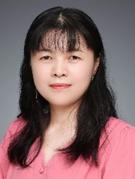Keynote Speaker

Lihua Wang
Professor, School of Aerospace Engineering and Applied Mechanics, Tongji University,Shanghai, 200092, P.R. China
Speech Title: Improved artificial neural network algorithms and its applications for non-destructive testing
Abstract: In machine learning, the most commonly used and effective algorithm is the artificial neural network (ANN) algorithm, which has the advantages of fast computing speed, strong self-learning ability, good robustness etc.. Among the ANNs, back-propagating neural network (BPNN) is one of the most commonly used neural network, which is composed of multi-layer neurons connected to each other to form a network structure. However, due to the lack of theoretical support for the selection of initial parameters and activation function, it often leads to slow convergence and local optimization, and drags the convergence and generalization ability. At the same time, in the mechanical problems, it is difficult to solve some complex problems with complicated models. With the help of artificial neural network algorithms, the numerical computation efficiency can be effectively improved and a new solution can be provided for some complex mechanical problems. On the one hand, based on the loss function analysis of mechanics and the basic theory of fracture mechanics, this work proposes two different improvement schemes of BP algorithm. The selection of weights and thresholds and activation function are optimized respectively. Numerical analysis shows that the improved algorithm can improve the accuracy, convergence and efficiency of numerical results. On the other hand, a deep extended causal convolution network is constructed based on the WaveNet model to repair the missing experimental data of shale fracturing. The proposed new algorithms have higher accuracy, efficiency and convergence for solving the three-dimensional surface reconstruction problem and crack propagation problem. Moreover, the missing shale fracturing experimental data can also be repaired on the selected deep learning algorithms.
We also propose a multilevel Long Short-Term Memory (LSTM) neural network combined with ultrasonic detection to identify the lamination defects in carbon fiber composites. Unlike conventional ultrasonic detection that requires multiple sets of probes, this method only employs a one-to-one transmission and reception mode. This approach uses ultrasound waveform data collected from a single set of probes to predict the locations and sizes of lamination defects. Moreover, the multilevel LSTM method exhibits convergence, and incorporating more data can further promote the prediction accuracy. This method offers a time-saving, labor-saving, and cost-effective solution for detecting and analyzing defects in CFC.
Biography: Dr. Lihua Wang is a professor at School of Aerospace Engineering and Applied Mechanics in Tongji University, Shanghai, China. She is currently a General Council Member of the International Association for Computational Mechanics (IACM) and the International Chinese Association for Computational Mechanics (ICACM). She is the recipient of several awards, including the APACM Award for Young Investigators in Computational Mechanics, the ICACM Young Investigator Award, and the Du Qing-Hua Medal & Young Researcher Award of Computational Methods in Engineering. She authored more than 100 journal publications, and has been invited to deliver more than 10 plenary and invited lectures at international conferences. She served as the Editorial Board Member of four journals and guest editor of two journals. Her research interests include development of meshfree methods and machine learning, fluid-structure interaction, inverse problems, functionally graded materials, and rigid-flexible coupling dynamics.
